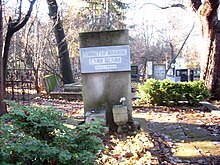Elin Pelin (Author)
Elin Pelin ( Bulgarian Елин Пелин ; * July 8, 1877 in Bajlowo ; † December 3, 1949 in Sofia ), bourgeois Dimitar Ivanov Stojanow (Bulgarian Димитър Иванов Стоянов ) was a Bulgarian writer with stories from the world of the peasant.
Life
The offspring of an extended family from the village of Bajlowo near Sofia began reading and writing at an early age. After training as a teacher, he taught in his native town for a year in 1895. His first publication appeared in 1901, the success of which encouraged him to move to Sofia. There Pelin worked as a librarian for the university library and invented his later famous pseudonym ( pelin = Bulgarian for mugwort ). 1906–1907 the already popular author lived in France to learn the national language. From 1910 to 1916 he was director of special collections at the Bulgarian National Library and editor of a number of periodicals, including the children's magazine Weseluschka . During the Second World War he served as a war correspondent.
In 1911 one of his most famous works, Die Geráks (Bulgarian: Гераците / Geratsite ) appeared. It describes a traditional village family during the development from simple country life to modern Bulgarian society; a world in which the old values of family love and closeness to the earth are in the process of dissolving. His second major work Earth (Bulgarian: Земя / Semja ) was printed in 1922. In this book, Pelin designed a panopticon of characters that reflect the national self-image.
Pelin's works - poems, short stories and novellas - contain the peasant and rural atmosphere of ancient Bulgaria. He had a penchant for short stories, of which the humorous text Pischo und Penda (Bulgarian Пижо и Пенда) is perhaps the best known. As an outstanding representative of Bulgarian prose, he also made a significant contribution to Bulgarian children's literature. His fairy tale Jan Bibijan and his journeys to the moon still delight today.
From 1924 to 1944, in addition to his literary work, Pelin was a curator at the Ivan Wasow Museum . In 1940 he became president of the Bulgarian Writers' Union. After the Second World War he managed to avoid being banned from working. The communist government classified him as a “realistic, critical author”, as a “precursor of socialist realism ”, who did not understand the true nature of the bourgeoisie , but correctly described the working life and individual resistance of exploited farm workers.
Earth and The Geráks were filmed several times along with other works (1930 and 1957 or 1958).
Honors
The Bulgarian city of Elin Pelin is named after the author. The same has been true since 2008 for Elin Pelin Point , a headland on Smith Island in Antarctica.
literature
- Dimitŭr Konstantinow Kosew: Bulgaria Past & Present . Pub. House of the Bulgarian Academy of Sciences, 1982, p. 175.
Web links
- Elin Pelin in the Internet Movie Database (English)
- Elin Pelin at Radio Bulgaria (English)
| personal data | |
|---|---|
| SURNAME | Pelin, Elin |
| ALTERNATIVE NAMES | Пелин, Елин (Bulgarian); Stojanow, Dimitar Ivanov (real name) |
| BRIEF DESCRIPTION | Bulgarian writer |
| DATE OF BIRTH | July 8, 1877 |
| PLACE OF BIRTH | Bajlowo |
| DATE OF DEATH | December 3, 1949 |
| Place of death | Sofia |

